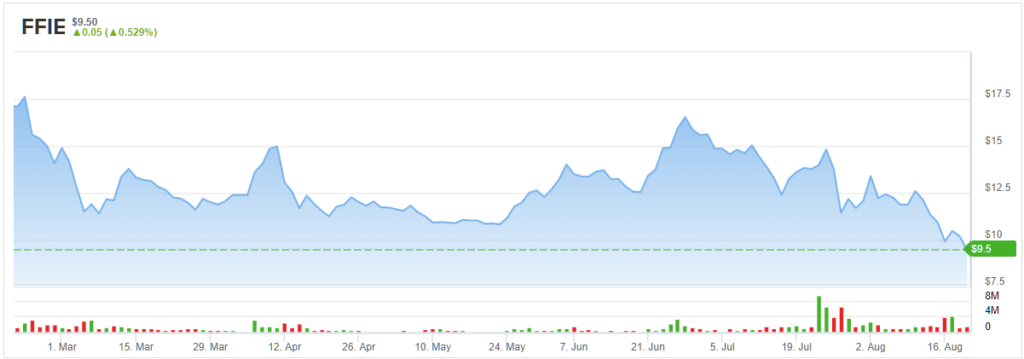In all walks of life, the only certainty is change. No matter what happens, from the stock markets to politics to the TV lineups, everything will change. Change can come slow, or change can come fast, and however it comes, we’ll need to adapt.
The automotive industry is in the throes of an epoch-making change right now. Electric vehicles (EVs), a technology as old as the automotive industry, has matured. New tech – in drive trains, electric motors, batteries, and more – has made the commercialization of EVs possible.
According to Wedbush analyst Daniel Ives, the EV sector is on the verge of dramatic growth, from 3% of global automotive sales now to 10% by 2025 and 20% by 2030.
Ives notes that EV stocks have been under pressure from a semiconductor chip shortage, a risk-averse mindset, and increasing competition. That last point may be key to understanding the EV sector; in Ives’ words, “…there are roughly 150 OEMs globally going aggressively after the EV market which we view as the biggest change to the auto industry since the 1950s.”
While the combination of headwinds and a new market sector caught up in a state of flux makes this a difficult moment for EV bulls to get a grip on the situation, Ives remains optimistic.
“Our view is that while frustrating, this is a near-term trading dynamic that does not change our unwavering bullish view of the sector for the coming years,” Ives wrote.
Ives isn’t just generally bullish on EVs – he has not been shy about choosing stocks from the emerging EV universe that are primed for gains in the months and years ahead. We’ve opened up the TipRanks database to get the latest details on three of Ives’ stock picks; let’s take a look at them, and find out what brought this analyst to these stocks.
Electric Last Mile Solutions (ELMS)
First up is Electric Last Mile Solutions, a company seeking to fill a unique niche in the automotive industry. ELMS is developing an all-electric delivery van, optimized for short range urban transport, filling in the ‘last mile’ of product supply chains. The company is based in Troy, Michigan, allowing it to tap into the collected wisdom of the Detroit-area car sector, and is in the process of developing and fitting out a 675,000 square foot manufacturing plant in Indiana. ELMS plans for the factory to produce up to 100,000 vehicles per year when it is up and running.
The primary vehicle coming off that production line will be a delivery van featuring a 150 mile range, a 171 cubic foot cargo space, and a 2,100 payload capacity. These features are comparable to current gasoline-powered delivery vehicles, and are suitable for a short-range urban driving and delivery environment. ELMS plans to launch its delivery van before the end of this year.
In recent weeks, ELMS has been accelerating preparations for the rollout of regular production. In July, the company announced a partnership with Thermo King to integrate the E-200 refrigeration unit with ELMS’ all-electric van, to create the first refrigerated delivery vehicle. And, earlier this month, the company set its production schedule for 2021, a key milestone on the path to full automotive production.
Also this month, ELMS released its 2Q21 results. Among the key points: putting the strategic supply chain in place, updating the 2021 production volume to 1,000 units, and acquiring the Indiana manufacturing facility.
The most important recent update, however, was the completion of the company’s SPAC merger with Forum Merger III on June 28. The move brought the ELMS ticker onto the public markets, along with raising $294 million in new capital.
The SPAC merger got the attention of Wedbush’s Ives, who describes ELMS as his favorite commercial last mile name. The analyst rates the stock an Outperform (i.e. Buy) along with a $17 price target. At current levels, this target suggests ~119% upside for the year ahead. (To watch Ives’ track record, click here)
“In our opinion, ELMS is redefining last mile commercial solutions by helping its customers save money by providing the lowest TCO possible…. The widespread shift to e-commerce seen across industries in buying and other fulfillment methods (buy online, pick up in-store, contactless delivery, etc.) has put last-mile delivery front and center with EV the next step on this last mile journey. Popularity and consumer demand for fulfillment in same and next day delivery have risen during the pandemic, forcing retailers to adopt quicker fulfillment capabilities,” Ives wrote.
The analyst summed up, “We believe the current climate is very favorable for ELMS at this point as we are in the first inning of a $5 trillion market opportunity over the next decade…”
That Wall Street agrees with Ives on the potential here is clear from the analyst consensus rating, which is a unanimous Strong Buy based on 6 recent reviews. The shares are selling for $7.73, and their $15.60 average price target implies an upside of ~102% over the next 12 months. (See ELMS stock analysis on TipRanks)
Faraday Future Intelligent (FFIE)
Based in LA, California, Faraday Future designs and engineers next-gen smart EVs, and is planning a production facility in Hanford, California. Faraday is looking into contracting with a manufacturing partner in South Korea to meet planned expansions in vehicle production, and has engineering and sales capabilities in China.
Faraday’s first vehicle model, the FF91, is a four-door, all-electric vehicle with built-in wireless connectivity options and autonomous driving capabilities. The company is taking pre-orders on the vehicle, and expects to release production models next year. Faraday is planning to sell 400,000 units over the next 5 years, and has already taken more than 14,000 reservations.
To raise capital for the upcoming production launch, Faraday went public through a SPAC merger last month. The SPAC, Property Solutions Acquisition Corporation, approved the combination transaction on July 21, and the FFIE ticker started trading on the NASDAQ the next day. The SPAC transaction brought gross proceeds of $1 billion to Faraday.
Ives sees potential for Faraday – in fact, it is his favorite disruptive EV OEM. The analyst rates the stock an Outperform (i.e. Buy), and his $17 price target implies a one-year upside of ~79%. (To watch Ives’ track record, click here)
“The company is now in a position of unique strength on the EV consumer luxury front and is shifting focus to the FF 91 scheduled to be released in 2022… By creating new technologies, integrating clean mobility, and connected digital ecosystems, FF is attempting to redefine the future of the automotive industry,” the analyst noted.
The analyst added, “We believe the company is set to create a new category in the EV space with its game-changing FF 91 vehicle and create a major brand within the high-end EV market opportunity. The company is expected to build 2,400 vehicles in 2022, followed by 38,600 units in 2023 and 300,000 in 2025 with the FF 81/FF 71 keys to broader consumer adoption.”
Some stocks slip under the radar, picking up few analyst reviews despite sound performance, and this is one. Ferreira’s is the only recent analyst review on record here. (See FFIE stock analysis on TipRanks)
Hyzon Motors (HYZN)
Where the other companies on this list produce purely electric-powered vehicles, Hyzon is a maker of hydrogen fuel cell trucks and commercial vehicles. Hyzon has begun production, and delivered 500 fuel-cell powered vehicles over the course of 2019 and 2020. The company is engaged in production of medium and heavy duty trucks, and full sized city busses and highway coaches.
Like the other companies on this list, Hyzon has recently gone public through a SPAC merger transaction. The combination, with Decarbonization Plus Acquisition Corporation, was approved by shareholders on July 15 and completed on July 16. The HYZN ticker started trading on July 19. Hyzon realized $550 million in proceeds from the transaction, which it is using to ramp up operations and begin commercial production.
This month, Hyzon began delivering regular production vehicles to European customers, and is preparing customer trials in the US. The trial, with a commercial port trucking company in Southern California, Total Transport Services, will begin in Q4 of this year. Hyzon will provide Total with a Class 8 heavy-duty fuel cell electric truck for 30 days of road testing in operational condition.
Hyzon reports it is on track to complete 85 vehicle deliveries by the end of this year, and is planning for future expansion. The company signed an understanding with Australia’s Superior Pak, a refuse collection company, for up to 20 trucks by 2022. The agreement calls for an initial supply of 5 fuel cell powered refuse collection trucks for trial and testing, with an additional 15 trucks by the end of next year.
In his note on Hyzon, Wedbush’s Ives writes: “…Hyzon Motors gains a competitive advantage in the market, existing as the sole pure-play hydrogen mobility corporation in the United States… Built using state-of-the-art technology, the company looks to shift the zero-emissions commercial vehicles landscape, focusing on delivering heavy-duty trucks, coaches, and buses to market. In addition to auto vehicles, the company has identified aviation, marine, and rail as potential growth avenues moving forward. Hyzon management looks to marry supply with demand, catered specifically to customers in order to optimize production, then securitize vehicles to make operations capital efficient.”
These comments back up Ives’ initial rating of Outperform (i.e. Buy), and the analyst’s $10 price target implies an upside of ~30% over the next 12 months. (To watch Ives’ track record, click here)
Ives’ is one of 3 recent reviews on Hyzon, and they all agree that this is a stock to by, making the consensus rating a Strong Buy. The shares are priced at $7.65 with an average price target of $17.67, for an upside potential of 131% in the year ahead. (See HYZN stock analysis on TipRanks)

To find good ideas for EV stocks trading at attractive valuations, visit TipRanks’ Best Stocks to Buy, a newly launched tool that unites all of TipRanks’ equity insights.
Disclaimer: The opinions expressed in this article are solely those of the featured analysts. The content is intended to be used for informational purposes only. It is very important to do your own analysis before making any investment.


















